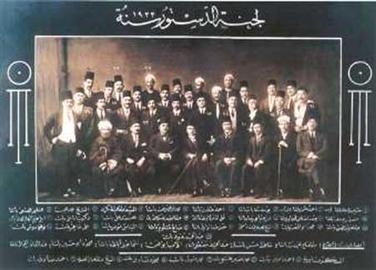 |
| Committee that drafted Egypt's 1923 Constitution |
As I regard the final list of the 100 members of Egypt's Constituent Assembly and the dominance of two hegemonic political powers over it, I cannot help but experience a bitter feeling. All I can see is another potential glorious moment squandered for a nation in desperate need for one.
Whereas I remain mindful of the well-deserved dominance of the FJP and Al-Nour over parliament, as well as their right to exercise their earned position on policy issues as the majority in Parliament, I remain staunch in my conviction that the Constituent Assembly and Egypt's next constitution are matters that transcend parliamentary seating distributions.
This constitution is set to represent all of Egypt. It is hoped to be a perfect document, though a constitution never is, and amendments will always take place by force of time and evolution, trial and error. But it was vehemently critical that this constitution of all constitutions carries the equal weight of Egypt's entire political spectrum behind it.
First, this should be the first free constitution to be drafted in the history of Egypt. While I do accept that SCAF's reign tarnishes the "freedom" of this constitution, yet this Constitution has the chance to become the pure work of democratically-elected Egyptian hands, and not colonial, monarchical, and other expressly dictatorial forces. Even further, this constitution will be drafted after a revolution that was the first of its kind for the nation, in which countless lives were sacrificed, and continue to be, for this honour and right as citizens of this nation. Perhaps it might not end up being an entirely freely-drafted constitution, but it should at least end up being our freest ever.
Second, most of the parties which had participated in the parliamentary elections were new parties that had been founded less than one year ago, whose members and candidates did not have sufficient-to-any electoral experience, and/or did not have the ground network or finances that would allow them to campaign effectively. As a result, while FJP and Al-Nour would have probably dominated either way, the weight of such a dominance could have significantly been different had the new parties been better prepared. I accept that these past words might stench with the phrase "sore loser" indeed, but I am genuine in my convictions.
There was a political phase in Egypt right after the revolution that I refer to as "Post-Revolution Politics", characterised by a greater non-partisan rhetoric, and more active and sincere efforts at national reconciliation, coalition building, and group decision making. This was the form of politics we needed to see in this Constituent Assembly and in the deliberative and procedural processes leading to it. Instead, we ended up witnessing the uninspiring conduct of standard "Party Politics", wherein each side tries to get as much as what they can. It was both too early for that, and hardly the occasion for it as well. I realise the naiveté of the idealism of what I am writing, but revolutions are founded upon a degree of idealism, naive or belligerent. And, well, we actually did just have a revolution.
While there are many respectable and undebatable names on the final list of members of the Constituent Assembly, I reiterate once more that all elements of the political spectrum should have had more equal representation in this grouping of men and women drafting the future of Egypt. This was my position in February of 2011 right after the revolution, remained my position in the October right before the elections, and continues to be my position as I write these words at this moment in time.
And while we're on the subject of "men and women drafting the future of Egypt," there should have been more women.
No comments:
Post a Comment